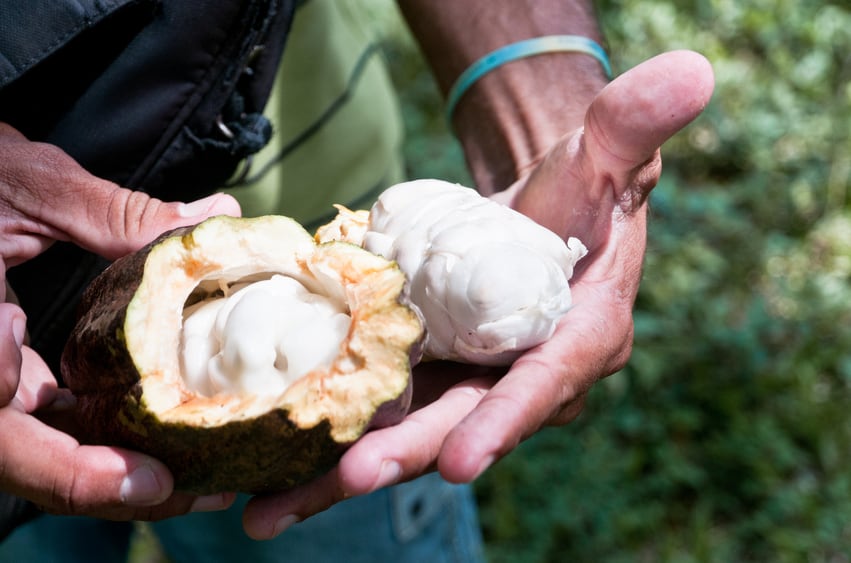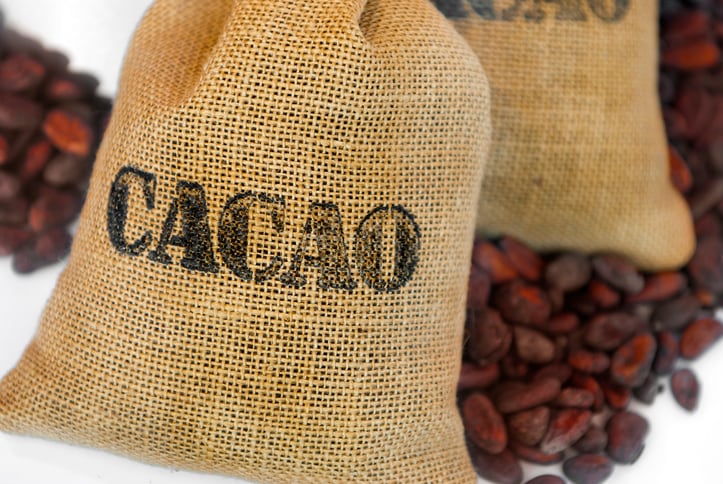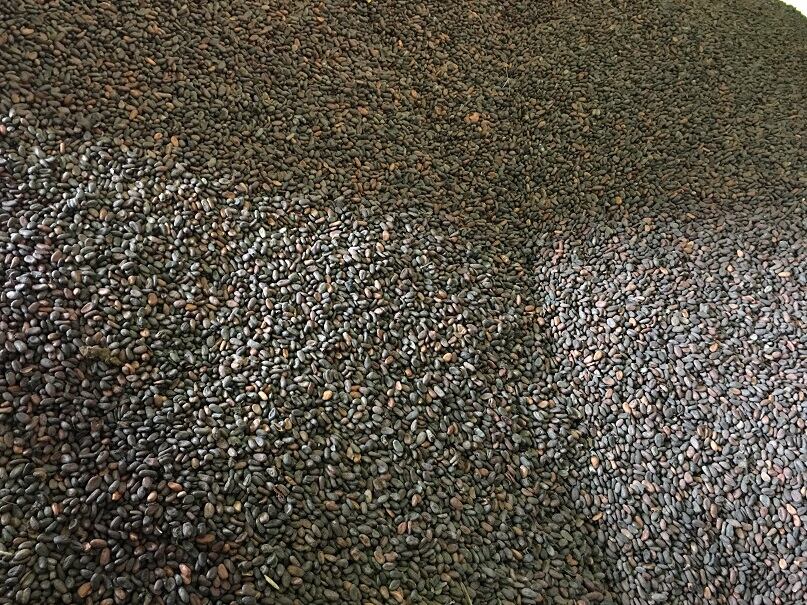They say such an approach will further help farmers escape structural poverty and will allow a living income for growers and their dependents, ensuring existing sustainability efforts are not in vain.
Cocoa Barometer Consortium
VOICE Network, ABVV-FGTB Horval (Belgium), FNV (Netherlands), Inkota Netzwerk (Germany), Oxfam (Netherlands, Belgium), Public Eye (Switzerland), Stop The Traffik (Netherlands, Australia), Südwind Institut (Germany), Green America (USA), Hivos (Netherlands), International Labor Rights Forum (USA), Mondiaal FNV (Netherlands), Oxfam America (USA), Solidaridad (Netherlands)
The full Cocoa Barometer report is due in October 2017.
The NGOs – part of the Cocoa Barometer Consortium – this week published a consultation paper on approaches to ensure a living income for smallholder farmers by raising farm gate prices.
Industry-led body, the World Cocoa Foundation (WCF), has welcomed the paper and says the proposal “merits more discussion”.
Flexible premiums and minimum price
The NGO paper pushes for regulatory bodies in the main West African origins - Cocobod in Ghana and the Conseil du Café-Cacao (CCC) in Côte D’Ivoire - to move away from setting farm gate prices based on the international trading prices.
It calls for a significantly higher fixed farm gate price nationally and at regional level that ensures a decent livelihood for the start of each growing season.
The NGOs say chocolate companies should pay “flexible premiums” that vary depending on the fixed farm fate price to guarantee a living income for farmers and their dependents.
Until such a system is established, it pushes chocolate makers to individually set a minimum price for cocoa per metric ton (MT).
Everything except prices?
Antonie Fountain, co-author of the paper and managing director of the VOICE Network, told ConfectioneryNews: "Everyone agrees a price increase is not the only thing we need to be looking at."
How much do cocoa farmers earn?

A recent study funded by Barry Calllebaut found farmers in Côte D’Ivoire typically earn less than $1 a day – below the World Bank’s threshold of extreme poverty for the country ($2.40).
"But it seems we are looking at everything except for how to raise prices for cocoa farmers."
The paper claims industry efforts are focused mainly on the “important variable” of productivity, but it says there is “far too little” conversation on pricing.
It comes as cocoa prices have plummeted $1,000 per metric ton (MT) since September, a loss of 30% in value, which, the NGOs say, will have “disastrous results” for already impoverished cocoa farmers in West Africa and could undo sustainability efforts.
"The cocoa price decline is a very clear example of our extremely deregulated, neo-liberalized global commodity system where it's a free-for-all,” said Fountain.
He warned that a focus on productivity alone could lead to oversupply, a decline in prices and may mean farmer incomes are unchanged.
Without a discussion on pricing, Fountain said all the gains in sustainability efforts in the last 10 years could be wiped out in the next year.
Pricing in West Africa

Cocobod in Ghana and the CCC in Cote D'Ivore typically set minimum cocoa prices once a year, which are based on the world market price. The CCC said last month the price for farmers in Côte D’Ivoire will drop from CFA 1,100 per kg ($1.81) for 2016-17 season possibly to around CFA 720 per kg ($1.19) if London prices remain low. Fountain alleges farmers are occasionally paid below fixed minimums as there is a lack of enforcement, especially evident in the past crop season after the price fell.
Some small chocolate companies already have minimum pricing
The NGOs urge the industry to ensure higher farm gate prices before the next main crop season (October 2017 in Cote D’Ivoire) by implementing floor prices or flexible premiums.
Some smaller chocolate companies, such as Tony’s Chocolonely, already have minimum prices.
Other firms like Taza Chocolate and Ingemann have direct supply chains and won't pay less than roughly $2,800 per MT. Current world prices are at around $1,900 per MT, according to the International Cocoa Organization (ICCO).
"There's nothing to stop Mars, Nestlé, Barry Callebaut and Cargill to say we're not going to pay less than this because we know that is really going to harm the farmers,” said Fountain.
He estimates prices would need to rise around three to four times to provide a living income, but encourages stakeholders to measure living income by region.
WCF reaction
Richard Scobey, president of industry-backed body WCF, told us current market conditions “threaten to undermine long-term sustainability” and he welcomed dialogue on how to boost farmer income.
“The specific proposal to develop a flexible premium system for sustainably produced cocoa is interesting and merits more discussion.
“We would like to understand better where has this been tried, what are the lessons learned, how would the premium be split between the farmer, the farmer organization, and the community, and how this system would fit with the ongoing evolution of cocoa certification,” he said.
He added: “Raising the price of cocoa to the farmer is not sufficient by itself – and could in fact lead to unforeseen damaging consequences like flooding the market with increased supply, and accelerating deforestation and land degradation from new plantings.
He said any price increase must be accompanied by complementary actions to avoid this scenario.
WCF advocates four steps:
- Improved land-use planning and enforcement of national environmental regulations to ensure cocoa is grown only in environmentally sustainable areas.
- Added investment in long-term sustainability programs like CocoaAction.
- Increased transparency about the way regulated prices and cocoa taxes are determined, and about the spending of these cocoa tax revenues.
- Industry investment in chocolate market development, particularly in emerging economies like India, China and Brazil.
Scobey added the WCF strongly endorses crop diversification to improve cocoa farmer income.
Avoiding oversupply

The NGO paper cautions that such pricing action could lead to an oversupply of cocoa. To avoid this scenario it urges origin governments to implement agricultural policy reforms and possibly to consider physical limitation of cocoa supplies through quotas.
Mars and Mondelēz on pricing
Mars’ global procurement head Barry Parkin said last year that cocoa living income may need to quadruple to secure the long-term future of the crop.
He said that would require increased productivity and may require alternative crops on larger land and "may require higher farm gate prices".
Cathy Pieters, director of Mondelēz’s cocoa sustainability program Cocoa Life, told this site: “While it’s premature to comment on specific proposals, we agree with the VOICE Network that no one group nor intervention can solve this issue and multi-stakeholder engagement is essential.
“We do not set the market price of cocoa, which typically fluctuates due to many factors. However, what we can do as a chocolate manufacturer to improve livelihoods is to invest directly in cocoa farmers and their communities to build their resilience.”
She said Cocoa Life took an holistic approach that includes better farm business management, crop diversity, additional sources of income, women’s empowerment and access to finance.
Living income studies
The NGO paper says cocoa prices should be enough for farmers to earn a living income for themselves and their dependents. It urges industry to set a common measure for living income “within the very short term”.
The living income – which may vary by region – should be used as a basis for minimum cocoa prices, it says.
The NGOs allege premiums based on major certification programs, such as UTZ, Fairtrade and Rainforest Alliance, have had a “marginal impact” on cocoa farmer income.
Anti-trust fears
The paper says companies have often shied away from discussions on prices in fear on breaching anti-trust laws, but claims competition authorities are likely to permit conversations that combat poverty and protect human rights.
It says nothing is stopping individual companies unilaterally deciding to pay farmers more.
The paper claims companies can no longer hide behind ‘the market’ ahead of the next cocoa year.
Fountain alleged anti-trust concerns had been a "convenient excuse" not to address pricing.
"If you really wanted to change this - you could change this,” he said.
Fountain said pricing cannot be ignored since abject poverty among cocoa farmers is the driver of gender inequality, unlawful child labor, health and nutrition issues, deforestation and access to market and inputs.
